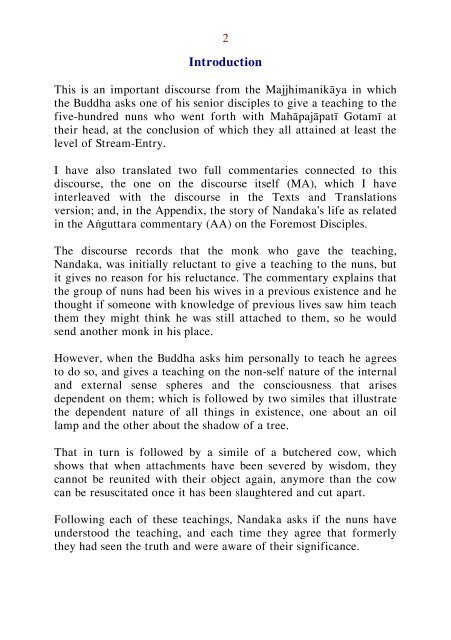Nandaka's Advice
An English translation of an important discourse and its commentary in which one of the Buddha’s senior disciples gives a teaching to five-hundred nuns, at the conclusion of which they all attain at least the level of Stream-Entry (Nandakovādasuttaṁ, MN 146 & AA 1.4.7)
An English translation of an important discourse and its commentary in which one of the Buddha’s senior disciples gives a teaching to five-hundred nuns, at the conclusion of which they all attain at least the level of Stream-Entry (Nandakovādasuttaṁ, MN 146 & AA 1.4.7)
Create successful ePaper yourself
Turn your PDF publications into a flip-book with our unique Google optimized e-Paper software.
2<br />
Introduction<br />
This is an important discourse from the Majjhimanikāya in which<br />
the Buddha asks one of his senior disciples to give a teaching to the<br />
five-hundred nuns who went forth with Mahāpajāpatī Gotamī at<br />
their head, at the conclusion of which they all attained at least the<br />
level of Stream-Entry.<br />
I have also translated two full commentaries connected to this<br />
discourse, the one on the discourse itself (MA), which I have<br />
interleaved with the discourse in the Texts and Translations<br />
version; and, in the Appendix, the story of Nandaka’s life as related<br />
in the Aṅguttara commentary (AA) on the Foremost Disciples.<br />
The discourse records that the monk who gave the teaching,<br />
Nandaka, was initially reluctant to give a teaching to the nuns, but<br />
it gives no reason for his reluctance. The commentary explains that<br />
the group of nuns had been his wives in a previous existence and he<br />
thought if someone with knowledge of previous lives saw him teach<br />
them they might think he was still attached to them, so he would<br />
send another monk in his place.<br />
However, when the Buddha asks him personally to teach he agrees<br />
to do so, and gives a teaching on the non-self nature of the internal<br />
and external sense spheres and the consciousness that arises<br />
dependent on them; which is followed by two similes that illustrate<br />
the dependent nature of all things in existence, one about an oil<br />
lamp and the other about the shadow of a tree.<br />
That in turn is followed by a simile of a butchered cow, which<br />
shows that when attachments have been severed by wisdom, they<br />
cannot be reunited with their object again, anymore than the cow<br />
can be resuscitated once it has been slaughtered and cut apart.<br />
Following each of these teachings, Nandaka asks if the nuns have<br />
understood the teaching, and each time they agree that formerly<br />
they had seen the truth and were aware of their significance.


















